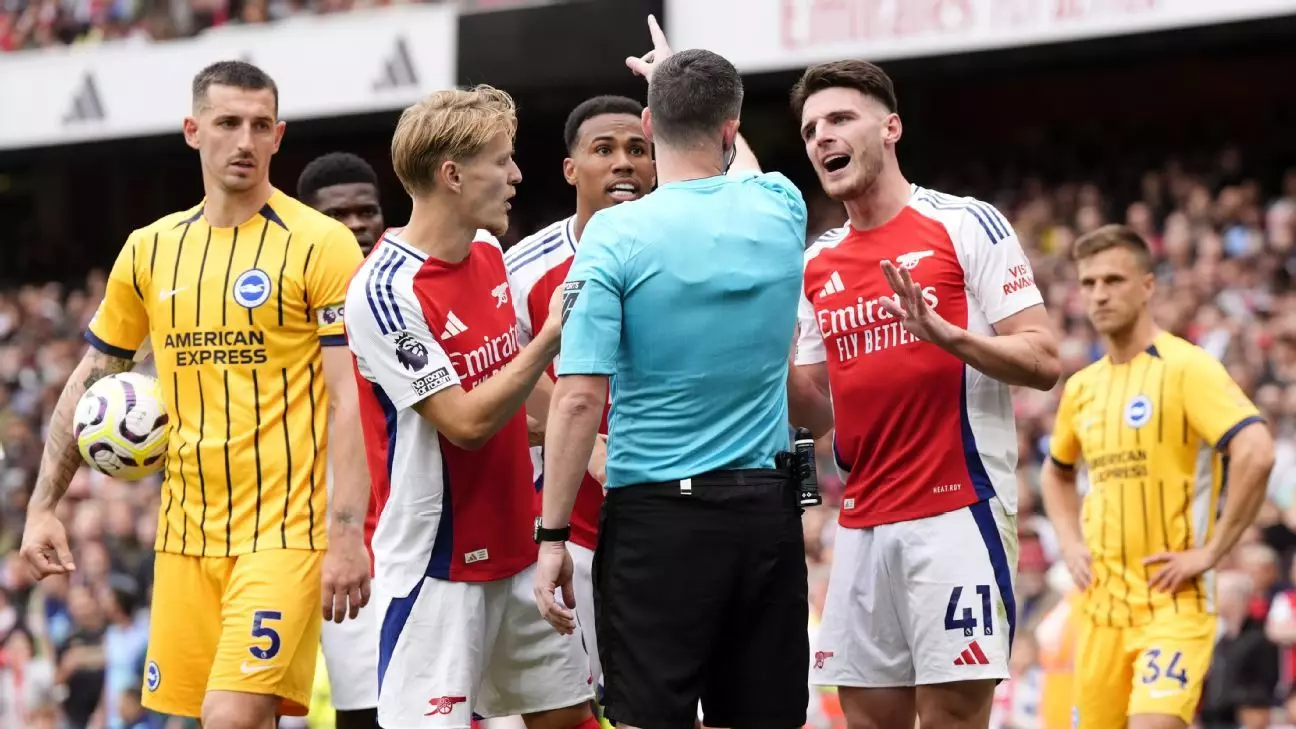Refereeing in football, particularly at the elite level, has never been more scrutinized. Recent developments, including the audio release from a contentious match between Arsenal and Brighton, have shed light on the pressures and decisions that referees like Chris Kavanagh face. This particular incident involving Declan Rice underscores the delicate balance referees must maintain between enforcing rules and managing player behavior. Kavanagh’s admission that he did not enjoy showing Rice a red card encapsulates the moral and ethical dilemmas that come with officiating.
In the throes of a match, referees must navigate a labyrinth of rules, player emotions, and the ever-watchful eye of technology. The fact that Kavanagh felt compelled to uphold authority despite personal reservations about the decision is reflective of a systemic issue in the sport—where clarity and leniency often find themselves in conflict. The draw between the need to maintain order and the imperative of fair play can often leave referees in an agonizing position.
It is essential to appreciate that the rules of football exist to promote fairness and sportsmanship on the pitch. Kavanagh pointed out that Rice was effectively delaying the game by kicking the ball away, an act that warranted a second yellow card. This decision, though harsh on the player, is a reminder that the spirit of the rules encompasses more than just black-and-white interpretations; it is about the broader implications for the game. Arsenal manager Mikel Arteta’s disbelief at the sending-off resonates with many fans who may not fully grasp the significance of such actions in maintaining competitive integrity.
The introduction of VAR has further complicated the role of referees. Although designed to assist in making accurate decisions, the existence of VAR can amplify the pressure on officials. Webb’s acknowledgment that Kavanagh’s decision was technically correct highlights a critical aspect of modern football: the rules must be enforced consistently, even when the context feels harsh. It raises the question of whether the emotional responses from players and managers can be circumvented in favor of a rigid interpretation of the rules.
VAR has been a game-changer, but it comes with its own set of challenges. The recent overturn of a penalty for Everton’s Dominic Calvert-Lewin after a review illustrates the complexity of these interventions. Webb’s assertion that the referee’s call was clearly wrong is crucial for understanding how VAR is meant to function: as a corrective measure rather than just an additional layer of scrutiny. It emphasizes that error, though human in nature, must have checks in place to ensure game integrity.
Additionally, the case of Dango Ouattara’s disallowed goal for Bournemouth reveals the ongoing debate surrounding technology’s role in officiating. Webb acknowledged that the ball made contact with Ouattara’s shoulder rather than his arm, yet the decision to disallow the goal indicates the fine margins that referees and VAR officials work within. Such instances beg the question: should football consider revising its interpretation of handball to avoid the ambiguity that confounds both referees and players alike?
The discussion surrounding yellow cards and VAR interventions also reveals the inconsistencies that can frustrate teams and fans alike. Webb’s acknowledgment that Joao Pedro should have received a yellow card for delaying the game exposes a critical inconsistency that can often go unnoticed during high-stakes matches. How can the game’s officials reconcile these disparities in officiating?
It becomes essential for football’s governing bodies to ensure that referees are not only well-versed in the rules but also trained to enforce them uniformly. As the Premier League actively seeks transparency through initiatives like “Match Officials Mic’d Up,” the hope is to bridge the gap between on-field decisions and fan understanding. Implementing these measures may not only lead to a more informed fan base but, more crucially, foster a culture of accountability within officiating.
As football navigates the complexities of officiating amidst the evolving landscape of the sport, understanding the challenges faced by referees becomes imperative. With enhanced training and clearer communication, perhaps the future of football can move towards a more cohesive interpretation of the rules, minimizing the emotional fallout of difficult decisions while preserving the essence of the game.

Leave a Reply